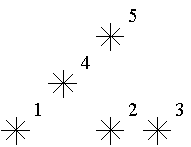Astronomers often examine star maps where stars are represented by points on a plane and each star has Cartesian coordinates. Let the level of a star be an amount of the stars that are not higher and not to the right of the given star. Astronomers want to know the distribution of the levels of the stars.

For example, look at the map shown on the figure above. Level of the star number 5 is equal to 3 (it's formed by three stars with a numbers 1, 2 and 4). And the levels of the stars numbered by 2 and 4 are 1. At this map there are only one star of the level 0, two stars of the level 1, one star of the level 2, and one star of the level 3.
You are to write a program that will count the amounts of the stars of each level on a given map.
The first line of the input file contains a number of stars N (1<=N<=15000). The following N lines describe coordinates of stars (two integers X and Y per line separated by a space, 0<=X,Y<=32000). There can be only one star at one point of the plane. Stars are listed in ascending order of Y coordinate. Stars with equal Y coordinates are listed in ascending order of X coordinate.
The output should contain N lines, one number per line. The first line contains amount of stars of the level 0, the second does amount of stars of the level 1 and so on, the last line contains amount of stars of the level N-1.
题目分析 :
题目的意思就是计算 星星的左下角 ( 包括 正左, 正下 ) 有多少颗其他的星星, 左下角星星的个数就是这个星星的等级, 题目要求输出每个等级星星的个数.
具体做法: 另外开个数组存储星星的等级,比他小的数的个数作为下标,即等级,每出现一次,数组加一,com数组的大小即为它存储数据的最大值。
代码如下 :
/*
MiYu原创, 转帖请注明 : 转载自 ______________白白の屋
http://www.cnblog.com/MiYu
Author By : MiYu
Test : 1
Program : 1541
*/
#include <iostream>
using namespace std;
const int MAX = 32005;
#define lowbit(x) ((x)&(-x))
int com[MAX], res[MAX], N;
void modify ( int pos, int val ){
while ( pos <= MAX ){
com[pos] += val;
pos += lowbit(pos);
}
}
int quy ( int x ){
int sum = 0;
while ( x > 0 ){
sum += com[x];
x -= lowbit(x);
}
return sum;
}
int main (int x)
{
while ( scanf ( "%d",&N ) != EOF ){
memset ( com,0,sizeof (com) ); memset ( res,0,sizeof (res) );
for ( int i = 1; i <= N; ++ i ){
scanf ( "%d%*d", &x );
x++;
res[ quy(x) ] ++; modify ( x,1 );
}
for ( int i = 0; i < N; ++ i )
printf ( "%d\n",res[i] );
}
return 0;
}